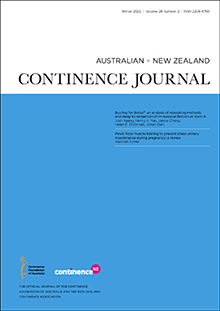The purpose of this review was to explore the current evidence for pelvic floor muscle training alone, or in combination with exercise, in the prevention of stress urinary incontinence during pregnancy. The aim of this review was to determine evidence-based recommendations for clinical practice. Electronic databases were searched in July 2021 for studies published from 2014 to 2021. Randomised controlled trials, cohort studies, reviews and systematic reviews were included if they assessed the effect of pelvic floor muscle training on preventing stress urinary incontinence or unspecified urinary incontinence in pregnant women. Thirteen papers – one meta-analysis, four systematic reviews, four reviews, and four randomised controlled trials – were included in this review. Despite results generally demonstrating a trend towards pelvic floor muscle training having a protective effect in this population, it remains unclear whether the effects are enough to be clinically meaningful. Greater effects were observed in studies where women were appropriately supervised and had sufficient training dosage to elicit pelvic floor muscle strength adaptations. Further research demonstrating consistency in dosage, how pelvic floor muscle strength is assessed and measured, and monitoring program adherence, is required.



